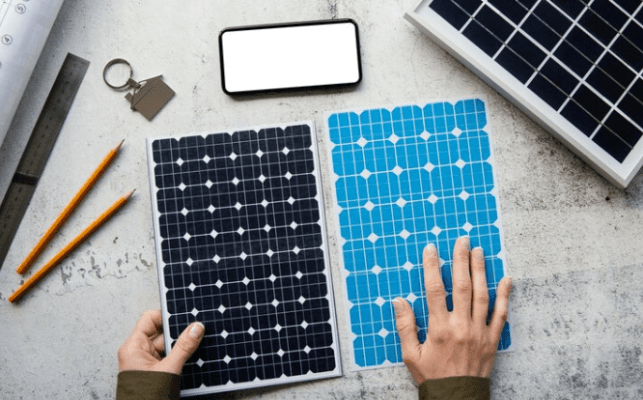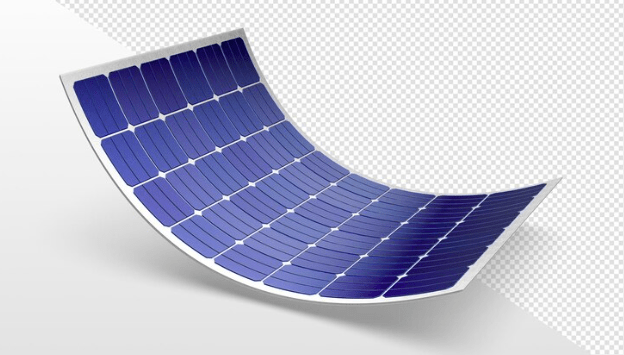Flexible solar panels are an exciting new development in the Pakistani solar market. While traditional rigid panels have long dominated, flexible panels offer unique advantages that make them ideal for specific applications. This guide will cover everything you need to know about flexible solar panels in Pakistan, including their benefits, drawbacks, availability, and potential uses.
What Are Flexible Solar Panels?
Unlike traditional solar panels with rigid glass or aluminum frames, flexible solar panels are constructed with lightweight, bendable materials. This allows for installation on curved surfaces, rooftops with uneven shapes, or even integration into fabrics.
Benefits of Flexible Solar Panels
- Versatility: Their ability to conform to curved surfaces makes them suitable for unconventional applications like carports, tents, or even rounded roofs.
- Lightweight and Portable: Easy to transport and install, making them ideal for remote locations or temporary setups.
- Durability: Made with weather-resistant materials, they can withstand harsh conditions.
Drawbacks of Flexible Solar Panels
- Lower Efficiency: Flexible panels generally have a lower energy conversion rate compared to traditional rigid panels.
- Limited Availability: In Pakistan, as of June 2024, flexible solar panels are still a relatively new technology with limited availability and potentially higher costs.
- Durability Concerns: While some flexible panels are designed for long lifespans, their long-term durability in Pakistan’s climate may not be fully established yet.
Availability of Flexible Solar Panels in Pakistan
As of June 2024, finding flexible solar panels in Pakistan might be challenging. Local stores may not carry them yet, so online marketplaces might be your best option. Be cautious of international sellers and factor in shipping costs and import duties.
Applications for Flexible Solar Panels in Pakistan
- RV/Camping: Perfect for powering portable generators or charging devices on the go.
- Uneven Rooftops: Ideal for rooftops with complex shapes or curves where rigid panels cannot be installed effectively.
- Remote Locations: Easy to transport and set up for temporary power needs in remote areas.
- Boats and Marine Applications: Can be curved to fit the shape of a boat and provide power while on the water.
Future of Flexible Solar Panels
With the increasing demand for renewable energy solutions, flexible solar panels have the potential to become more prevalent in Pakistan. As the technology matures and production scales up, we can expect wider availability, potentially lower costs, and increased efficiency.
Before You Buy
Carefully consider your specific needs and weigh the pros and cons of flexible solar panels. If portability and versatility are crucial, and the lower efficiency is acceptable, flexible panels might be a good option. However, for larger, permanent installations, traditional rigid panels might still be the more cost-effective choice.
Pros and Cons of Flexible Solar Panels
Pros:
- Versatility:
- Pro: Flexible solar panels can conform to curved surfaces, making them suitable for a variety of unconventional installations, such as on carports, tents, boats, and rooftops with complex shapes.
- Con: Despite their versatility, their application might be limited in certain environments where rigid panels are more efficient.
- Lightweight and Portable:
- Pro: Their lightweight design makes them easy to transport and install, ideal for remote locations, temporary setups, and portable applications.
- Con: This portability can sometimes come at the cost of reduced durability compared to traditional rigid panels.
- Durability:
- Pro: Flexible solar panels are made with weather-resistant materials that can withstand harsh conditions, making them suitable for outdoor use.
- Con: Their long-term durability, especially in extreme climates, may not be as well-established as traditional rigid panels, potentially leading to a shorter lifespan.
- Easy Installation:
- Pro: Flexible solar panels can be installed quickly and easily without the need for heavy mounting equipment, reducing installation costs and time.
- Con: The installation process, while easier, might require more frequent maintenance checks to ensure optimal performance.
- Innovative Applications:
- Pro: Their ability to integrate into fabrics and other non-traditional materials opens up new possibilities for innovative applications in wearable technology, portable chargers, and more.
- Con: These innovative applications are still relatively new and may not have the same level of efficiency or reliability as more established solar technologies.
Cons:
- Lower Efficiency:
- Con: Flexible solar panels generally have a lower energy conversion rate compared to traditional rigid panels, which can result in less electricity generation.
- Pro: Despite lower efficiency, they can still be highly effective in situations where portability and ease of installation are prioritized over maximum power output.
- Limited Availability:
- Con: As of now, flexible solar panels are not as widely available in Pakistan, potentially leading to higher costs and limited purchasing options.
- Pro: This limited availability is likely to improve as the technology becomes more popular and manufacturing processes advance.
- Durability Concerns:
- Con: While flexible panels are designed to be durable, their long-term performance and resistance to extreme weather conditions are not as well-proven as traditional panels.
- Pro: Advances in material science and manufacturing techniques are continuously improving the durability of flexible solar panels.
- Higher Initial Cost:
- Con: The initial cost of flexible solar panels can be higher than that of traditional rigid panels due to their newer technology and limited production scale.
- Pro: Over time, as production scales up and the technology matures, prices are expected to decrease, making them more affordable.
- Technological Maturity:
- Con: Being a relatively new technology, flexible solar panels may not have the same level of market trust and reliability as traditional solar panels.
- Pro: Continuous research and development are rapidly advancing the technology, promising improved performance and reliability in the near future.
Flexible Solar Panels vs. Rigid Solar Panels

Solar panels are a key component of any solar energy system, and choosing the right type can significantly impact the efficiency, installation process, and overall effectiveness of your solar setup. Here’s a comparison between flexible and rigid solar panels to help you understand their differences and decide which might be the best fit for your needs.
1. Flexibility and Versatility
- Flexible Solar Panels:
- Made from thin layers of photovoltaic material on a flexible substrate.
- Can be bent and curved to fit irregular and curved surfaces, making them ideal for applications on boats, RVs, tents, and other non-flat structures.
- Lightweight and easier to transport and install in hard-to-reach areas.
- Rigid Solar Panels:
- Constructed with a sturdy frame, usually made from aluminum, and encased in tempered glass.
- Best suited for installations on flat, solid surfaces like rooftops and ground-mounted solar arrays.
- Heavier and more robust, which can be beneficial for withstanding harsh weather conditions.
2. Durability and Lifespan
- Flexible Solar Panels:
- Generally less durable than rigid panels due to their construction and materials.
- More prone to physical damage, such as punctures or tears.
- Typically have a shorter lifespan and may not come with as long warranties as rigid panels.
- Rigid Solar Panels:
- Known for their durability and long lifespan, often backed by 25-year warranties.
- Resistant to environmental stressors like hail, wind, and snow due to their solid construction.
- Higher initial investment but potentially lower long-term maintenance costs.
3. Efficiency and Performance
- Flexible Solar Panels:
- Generally have lower efficiency rates compared to rigid panels.
- More suitable for applications where space is limited or where weight and flexibility are more important than maximum energy output.
- Innovations are ongoing, but current flexible panels typically produce less power per square foot.
- Rigid Solar Panels:
- Higher efficiency rates, translating to more electricity production per square foot.
- Better performance in a variety of weather conditions due to their robust build and protective glass covering.
- Ideal for residential and commercial installations where maximizing energy output is crucial.
4. Installation and Cost
- Flexible Solar Panels:
- Easier and faster to install due to their lightweight and adaptable nature.
- Can be adhered directly to surfaces without the need for mounting hardware.
- Often cheaper upfront but may require more frequent replacements or repairs.
- Rigid Solar Panels:
- Installation requires mounting hardware and can be more labor-intensive and time-consuming.
- Higher initial installation costs but potentially lower long-term costs due to their durability and efficiency.
- Cost-effective in the long run due to higher energy output and longer lifespan.
5. Applications
- Flexible Solar Panels:
- Ideal for mobile applications like RVs, boats, and camping.
- Useful for portable solar chargers and other off-grid uses.
- Can be installed on surfaces where traditional panels cannot fit.
- Rigid Solar Panels:
- Best for fixed installations on residential and commercial buildings.
- Suitable for large-scale solar farms and ground-mounted systems.
- Preferred for long-term energy solutions where space and structural integrity are not limiting factors.
FAQs on Flexible Solar Panels
1. What are the primary advantages of flexible solar panels over traditional rigid panels?
Flexible solar panels offer several advantages over traditional rigid panels, including versatility, lightweight design, and portability. Their ability to conform to curved surfaces makes them suitable for unconventional installations, such as on carports, tents, boats, and rooftops with complex shapes. Additionally, they are easy to transport and set up, making them ideal for remote locations and temporary setups.
2. Are flexible solar panels as efficient as traditional rigid panels?
In general, flexible solar panels have a lower energy conversion rate compared to traditional rigid panels. While technological advancements are improving their efficiency, they still typically lag behind rigid panels. However, for applications where portability and versatility are more critical than maximum efficiency, flexible panels can be a great option.
3. How durable are flexible solar panels in harsh weather conditions?
Flexible solar panels are designed with weather-resistant materials that can withstand various harsh conditions. However, their long-term durability, especially in extreme climates like those found in parts of Pakistan, may not be as well-established as traditional rigid panels. It’s essential to check the specifications and reviews of the specific flexible panels you are considering to ensure they meet your durability requirements.
4. Where can I buy flexible solar panels in Pakistan?
As of June 2024, flexible solar panels are still a relatively new technology in Pakistan, and their availability in local stores may be limited. Online marketplaces are likely your best option for finding flexible solar panels. Be cautious when purchasing from international sellers and factor in additional costs such as shipping and import duties.
5. What are the best applications for flexible solar panels in Pakistan?
Flexible solar panels are ideal for a variety of applications in Pakistan, including:
- RV/Camping: Providing portable power for generators and charging devices on the go.
- Uneven Rooftops: Installing on rooftops with complex shapes or curves where rigid panels are unsuitable.
- Remote Locations: Offering easy transport and setup for temporary power needs in remote areas.
- Boats and Marine Applications: Fitting curved surfaces on boats to provide power while on the water.
These panels are also suitable for temporary structures and emergency power setups, making them a versatile option for various energy needs.


